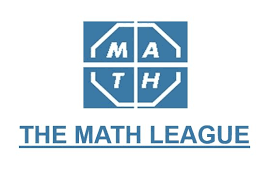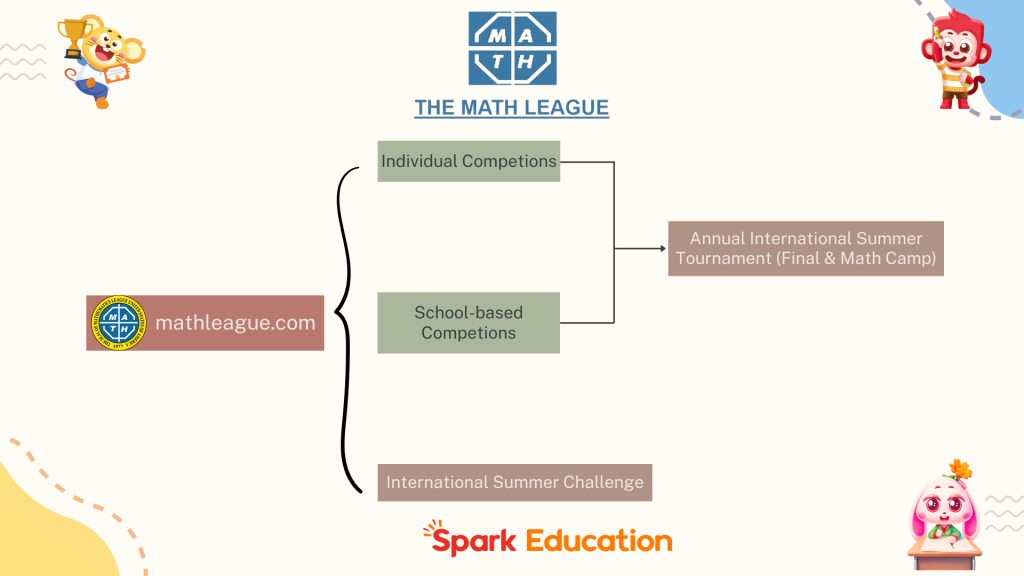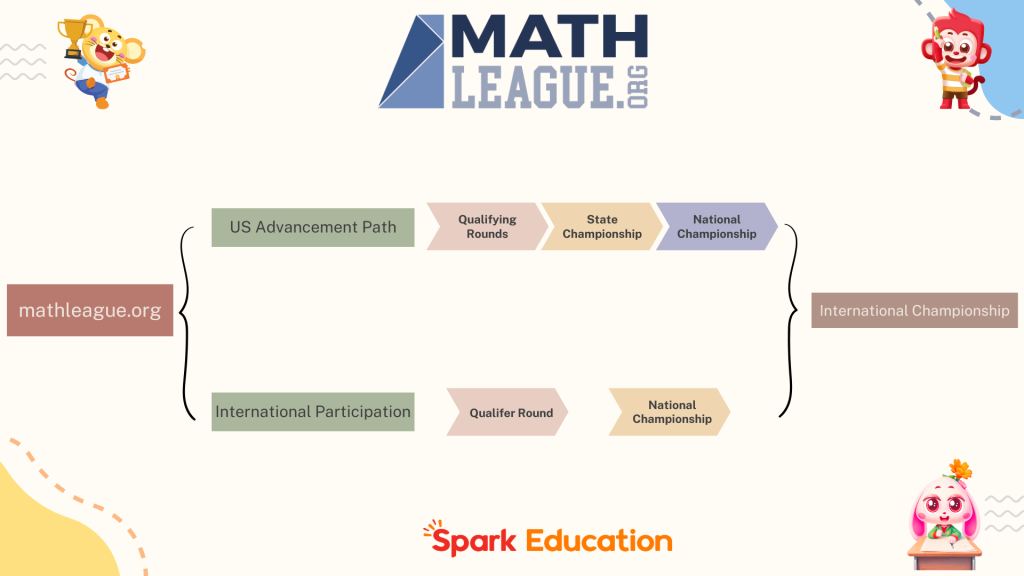In our previous blog posts, we introduced the Math League International Summer Challenge and the intensive prep courses offered by Spark Education. However, some parents have expressed confusion over another competition also called Math League in the United States. Are they the same? This blog will clarify the distinctions between these two competitions to help you choose the right one for your child.
Overview of the Differences Between mathleague.com And mathleague.org
| Name | The Math League | Mathleague.org |
|---|---|---|
| Logo |  |  |
| Establishment Year | 1977 Originate from the US | 1997 Originate from the US |
| Founder | Steven R. Conrad and Daniel Flegler | Tim Sanders |
| Participation Grades | Grades 1-12 | Grades 3-12 |
| Competition Format | Individual and School-based | Team-based (Teams of 4 students) |
| Regions | Global, including the U.S., Canada, and other countries | Mainly the U.S., with participation from other countries |
| Website | http://www.mathleague.com | http://www.mathleague.org |
Detailed Comparison
Overview of mathleague.com
mathleague.com offers both individual and school-based competitions. Here’s a detailed look:

Individual Competitions
mathleague.com divides its competitions into two stages: First Round and Second Round, as covered in our previous blog.
- First Round: Covers grades 1-12. Students who rank in the top 50% in their grade advance to the Second Round or receive corresponding awards.
- Second Round: For the 2023-2024 school year, the Second Round covers grades 4-9 (previously 4-12). Students who earn Honor Roll of Distinction and Honor Roll certificates qualify for the Annual International Summer Tournament (Final & Math Camp).
School-based Competitions
School-based competitions cover grades 4-12, with variations in the number of rounds, question types, and scoring systems for different grades. Most participants are from the U.S. and Canada, but schools from other countries can also register. For the 2023-2024 school year, schools from countries like China, Turkey, Australia, Brazil, Mexico, Colombia, Kenya, Thailand, Indonesia, Japan, Korea, the Netherlands, and Switzerland are participating.
- Teams: Schools form teams of participating students. Each student’s score is recorded individually, and the school’s total score is the sum of the top five individual scores.
- Ranking:
- Grades 4-8: Schools are ranked globally together.
- Grades 9-12: U.S. schools are ranked within their states, Canadian schools are ranked provincially, and other international schools are ranked together.
- Qualification for Annual International Summer Tournament (Final & Math Camp): Students in grades 4-9 qualify based on the following scores:
- Grades 4-5: A score of 26 or higher on Math League contests.
- Grades 6-8: A score of 30 or higher on Math League contests or 26 or higher on the algebra 1 contest.
- Grade 9: A cumulative score of 30 or higher on six high school contests or 26 or higher on the algebra 1 contest.
- Students can use scores from previous years to qualify.
Please note that if students wish to participate as a school team, they should first check the Math League website to see if their school is already registered. If not, they can contact their school’s relevant coordinator and the Math League organizers to register the school before entering the competition.
Annual International Summer Tournament (Final & Math Camp)
Open to grade 4-9 students who meet the above-mentioned criteria from both individual and school-based competitions. Although Math League contests are primarily held online (individual and school-based alike), all qualifying students are required to participate in the final onsite competition in the United States. The exact name of this tournament may vary slightly each year. The 2024 International Summer Tournament is currently in progress from July 13th to 28th.
International Summer Challenge
This competition also takes place in the summer, but it’s distinct from the Summer Tournament. Students are not required to have participated in any Math League contests prior to joining the Summer Challenge. Any students who are interested can participate in this competition at their grade level.
Overview of mathleague.org
Mathleague.org was founded in 1997 by renowned American mathematics educator Tim Sanders, former chairman of the American Regional Mathematics League (ARML). Mathleague.org hosts one of the largest networks of local and state math contests for elementary, middle, and high school students in the U.S. and abroad, running over 400 contests annually and reaching over 30,000 students each year.

Grades and Team Format
- Grades Covered: 3-12
- Team Format: Competitions are team-based, with teams of four students.
U.S. Advancement Path
- State Championship: In most states, top-scoring students in qualifying rounds are invited to compete in their State Championship. In some larger states, top-scoring students advance to a District Championship before qualifying for their State Championship.
- National Championship: Winners at State Championships are invited to the US National Championship.
- International Championship: Top teams from the U.S. National Championship advance to the International Championship.
International Participation
Countries such as China, Canada, New Zealand, and Singapore participate. Teams of four students compete in the Qualifier Round, with top performers advancing to their respective National Championships. The best teams from these national contests qualify for the International Championship.
How to Choose the Right Competition
- Individual Focus: If your child prefers competing individually and aims to advance through various rounds, mathleague.com is a suitable choice.
- Team Focus: If your child enjoys team-based challenges and working collaboratively, mathleague.org might be the better option.
- School Involvement: For schools looking to involve multiple students and compete as a team, both competitions offer this opportunity, but with different structures.
Understanding these differences will help you make an informed decision about which competition best suits your child’s interests and needs. Stay tuned for more insights and tips on helping your child succeed in math competitions!




